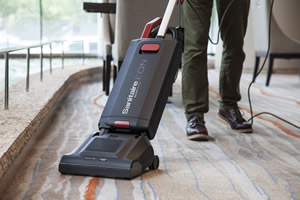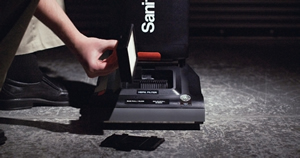Improve Indoor Air Quality in Schools with Better Vacuuming
Inadequate cleaning may affect up to 20% of the occupants of school buildings who are susceptible to allergies or asthma. ISSA, the international association serving cleaning professionals, released a comprehensive cleaning standard for K-12 schools, to provide building managers with a tool to effectively measure the cleaning process and implement steps to improve.
"Effective cleaning is especially important in light of a growing body of evidence that concludes that improved hygiene in schools results in reduced illnesses and reduced absenteeism," members of the standard's executive committee wrote.
 Proper vacuuming is at the cornerstone of effective school cleaning.
Proper vacuuming is at the cornerstone of effective school cleaning.
The Minnesota Department of Health, (MDH), conducted a widespread inspection of schools throughout the state and found levels of allergens that exceeded risk thresholds for asthma and allergy symptoms in most buildings. The allergy and asthma triggers included mold spores, pet allergens, and elevated dust mite allergens. Most were inadvertently transported into the schools by children, teachers and staff.
Floors contained the largest concentrations of allergens due to heavy foot traffic, and that carpeted surfaces, common in school auditoriums, offices and libraries, contained higher levels of allergens than hard-surface floors. The study also found that ideal maintenance practices for cleaning carpet were not fully implemented including:
- Deep cleaning carpeting at least twice per year;
- Replacing carpet according to manufacturer recommendations;
- Thorough daily vacuuming with high quality HEPA-filter vacuums; and
- Properly maintaining cleaning equipment.
The MDH study also found concentrations of dust-associated allergy and asthma triggers on student desks, furnishings, open shelves, window treatments, ventilation diffusers, educational materials and decorative items. Surfaces six feet above the floor – typically the height of ventilation diffusers – showed lung inflammatory potential of dust three times greater than dust on the floor.
Dalvin Green, product manager for Sanitaire, frequently consults with school maintenance directors to improve the indoor air quality of their buildings. Green recommends maintenance directors select vacuums that have earned the Carpet and Rug Institute Seal of Approval for soil removal, dust containment and carpet appearance.
 While upright vacuums are frequently associated with carpet cleaning, Green says commercial vacuums with sealed HEPA filtration also can effectively clean tile, and other surfaces and prevent allergy and asthma triggers from becoming airborne. Several cleaning professionals suggest that they can clean floors faster by removing dry dirt with a vacuum instead of a dry mop before wet-mopping. Canisters and backpack vacuums offer a fast-thorough way to remove dust from ventilation diffusers, window coverings and other above-the-floor surfaces. Green recommends schools also invest in spotters to clean other liquid biological contaminants that are common in schools.
While upright vacuums are frequently associated with carpet cleaning, Green says commercial vacuums with sealed HEPA filtration also can effectively clean tile, and other surfaces and prevent allergy and asthma triggers from becoming airborne. Several cleaning professionals suggest that they can clean floors faster by removing dry dirt with a vacuum instead of a dry mop before wet-mopping. Canisters and backpack vacuums offer a fast-thorough way to remove dust from ventilation diffusers, window coverings and other above-the-floor surfaces. Green recommends schools also invest in spotters to clean other liquid biological contaminants that are common in schools.
Sponsored by: Sanitaire